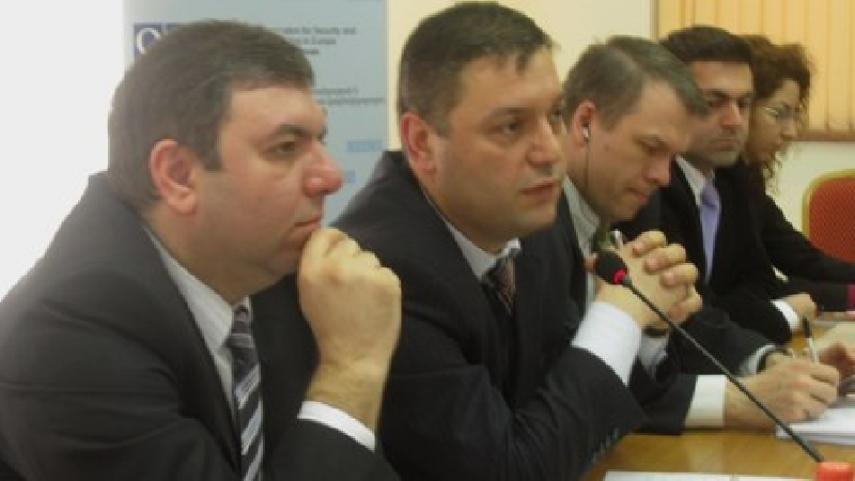NON-GOVERNMENTAL ORGANIZATION
The system of early conditional release in Armenia; reforms are needed

The number of persons released on parole has decreased in the last 5
years. In 2006 22 percent of prisoners eligible for release on parole were
released, while in 2010 only 7 percent were released.
These data were published in
the study conducted by Civil Society Institute “The system of early conditional
release in Armenia”, according to which the reason of decline in the number of
prisoners released on parole is that the administrative commissions are guided
by the “criteria” of the independent commissions and do not present the
categories of prisoners which are rejected by the independent commissions.
The Chart in the Study makes it clear
that about 30% of prisoners appearing before the independent commissions for
early conditional release are released according to the court’s decision.

CSI lawyer Arman Zrvandyan mentioned
that the mere fact that the prisoner did not provide reparations to the victim is
not a sufficient ground for rejecting the early conditional release of the
prisoner. “In a number of European countries the social rehabilitation of the
prisoner is dominant, i.e. if the penitentiary facility achieved its
correctional goals the prisoner should live in the society” Zrvandyan said.
As a result of the study CSI
recommends to make reforms in three phases. First it is necessary to review the
competences, staff and the proceedings of the decision-making bodies in the
system of early conditional release, as well as to develop and introduce new
tools.
“It is necessary to withdraw the
penitentiary from the bodies which make decisions on early conditional release.
In case of written consent of the prisoner whose mandatory prison term stipulated
by law is completed the penitentiary must present the corresponding documents
to the consideration of the independent commission. The documents should include
the assessment of the penitentiary on the behavior, programs implemented with the prisoner and their effects,
degree of willingness to live a law-abiding life”.
The second phase includes the
establishment of probation service in the Republic of Armenia. In this phase
the penitentiary carries out the assessment of behavior, the impact of the conducted
activities and estimation of the results thereof with regard to the prisoner in
the penitentiary.
“The results of assessment are sent to
the independent commissions. After the release the evaluation of risk of reoffending
by the prisoner is carried out by the probation service, which sends its
substantiated opinion together with the suggested conditions of release to the
independent commission. The commission evaluating the received materials makes
a conclusion on releasing the prisoner early or rejects the release” is
mentioned it the recommendations.
In the last phase effective operation
of the penitentiary and probation service should be ensured. As a result the
need for the independent commissions may cease to exist.
The attorney Narine Rshtuni referred
to the case of her defendant Manuk Semerjyan who has been in prison for 20
years and the term of consideration of his early release stipulated by law has
expired. The judge of the Criminal Court of Appeal Mher Arghamanyan did not
take the arguments of Semerjyan’s attorney Narine Rshtuni into consideration
that Semerjyan has a right to make use of the opportunity to be released on
parole and there is no psychological conclusion that in the last 5 years
Semerjyan behaved in such a way that today heis
dangerous for the society.
“Besides they bring a reason that
Semerjyan hasn’t compensated the damage caused to the victim. We have looked
for the victim and haven’t found him, besides during these 20 years he hasn’t
been given a chance to earn money himself and compensate the caused damage”
claims Rshtuni.
Despite the figures and shortcomings
presented in the Study the adviser to the Justice Minister, Nikolay Arustamyan found
that the Ministry is a few steps ahead in this problem.
“Legislative drafts are already developed
which are presented to the consideration of the Government, I do not know
whether they will pass at this session or not but I am sure they’ll be
discussed at the autumn session” ensured Arustamyan. He said that the Ministry
of Justice is ready to discuss all the proposals concerning the legal acts
developed by them.
The President of CSI Arman Danielyan
mentioned that they disagree with a number of provisions in those draft legal
acts and the proposals concerning them will soon
be presented to the Ministry and the public.
The
report was made and published in cooperation with Organization for Security and Cooperation in Europe (OSCE)
office in Yerevan.
Karine Ionesyan

